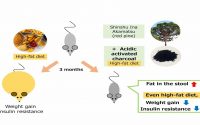Statins: High cholesterol medication associated with worse control of blood sugar – study
Statins: How the drug prevents heart attacks and strokes
We use your sign-up to provide content in ways you’ve consented to and to improve our understanding of you. This may include adverts from us and 3rd parties based on our understanding. You can unsubscribe at any time. More info
A research paper, published in JAMA International Medicine, detailed the effects of statin treatment and diabetes progression in those with the health condition. The large retrospective cohort study included 83,022 matched pairs of statin users and non-users. Measurements of high blood sugar registered higher in those who were taking statins than those who were not in the 12-year analysis.
Such a finding suggests that patients with diabetes who used statins experienced less control of their diabetes than patients who did not take statins.
In an overview of the research, Pharmacy News noted three conclusions.
Firstly, “individuals who had diabetes and were prescribed statins had a higher chance of insulin treatment initiation”.
Secondly, diabetics taking statin treatments “were more likely to develop significant hyperglycaemia and experience acute glycemic complications”.
And, thirdly, those same patients were “more likely to be prescribed extra glucose-lowering medications, according to the study results”.
What is hyperglycaemia?
NHS experts explained that hyperglycaemia describes high blood sugar, which can lead to the following symptoms:
Increased thirst and a dry mouth
Needing to pee frequently
Tiredness
Blurred vision
Unintentional weight loss
Recurrent infections, such as thrush, bladder infections (cystitis) and skin infections
Tummy pain
Feeling or being sick
Breath that smells fruity.
In the study, diabetes progression was 37 percent more in those who took statins compared to those who did not.
Commenting on the results was Kristi Kelley, PharmD, BCPS, BCACP, a clinical professor at Auburn University Harrison School of Pharmacy in Alabama.
And, thirdly, those same patients were “more likely to be prescribed extra glucose-lowering medications, according to the study results”.
What is hyperglycaemia?
NHS experts explained that hyperglycaemia describes high blood sugar, which can lead to the following symptoms:
- Increased thirst and a dry mouth
- Needing to pee frequently
- Tiredness
- Blurred vision
- Unintentional weight loss
- Recurrent infections, such as thrush, bladder infections (cystitis) and skin infections
- Tummy pain
- Feeling or being sick
- Breath that smells fruity.
In the study, diabetes progression was 37 percent more in those who took statins compared to those who did not.
Commenting on the results was Kristi Kelley, PharmD, BCPS, BCACP, a clinical professor at Auburn University Harrison School of Pharmacy in Alabama.

The doctor of pharmacy said: “Given [the 37 percent] increase, I was not surprised by the increased number of patients needing glucose-lowering medications or insulin.
“I was surprised by the results of the secondary analysis showing that the odds of progression of diabetes was greatest with the high-intensity statins.”
The study’s authors, however, did state that the “findings of the secondary analyses should be interpreted as exploratory”.
Pharmacist Kelly added: “This is something that is going to continue to be investigated and will be discussed among health care providers.”

The National Institute for Health and Care Excellence (NICE) stated: “Do not stop statins because of an increase in blood glucose level or HbA1c.”
If you are concerned about your statin use, you can discuss your concerns with your doctor.
For most people, the benefits of taking statins outweigh the risks of not taking them.
Diabetes UK added: “Statins are a commonly used medication and are often prescribed for people with diabetes to help them manage their condition.

“This is because having diabetes increases the risk of heart diseases, such as heart attack and stroke.”
For support over the telephone about diabetes and statins, you can call Diabetes UK’s helpline on 0345 123 2399.
Alternatively, you can contact the charity on [email protected].
Source: Read Full Article


